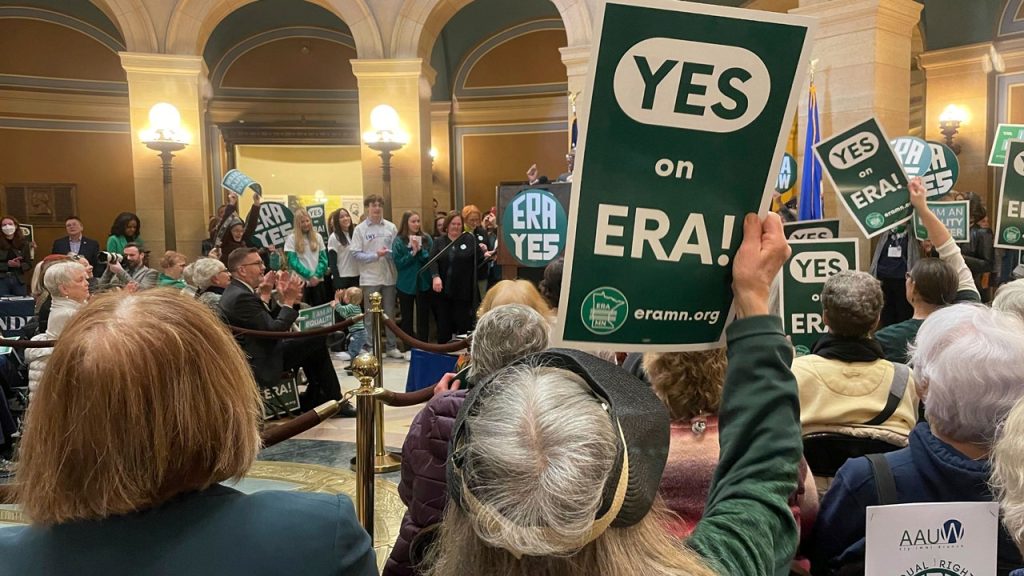Minnesota lawmakers are currently in the midst of a debate over a proposal to amend the state constitution to protect abortion and LGBTQ rights. The proposed Minnesota Equal Rights Amendment would provide comprehensive protections for these rights and would be among the most expansive measures in the nation if approved by lawmakers and then by voters in 2026. Supporters of the amendment, including groups like ERA Minnesota, Gender Justice, and OutFront Minnesota, argue that it is necessary to address issues of reproductive justice, pay inequity, historic stereotypes, and discrimination. The wording of the amendment would prohibit discrimination based on race, color, national origin, ancestry, disability, or sex — including gender identity, gender expression, and sexual orientation. If passed, the amendment would safeguard laws that protect individuals seeking abortion and gender-affirming care from being repealed by future lawmakers.
Opponents of the proposed amendment, including groups like Minnesota Family Council, Minnesota Citizens Concerned for Life, and the Minnesota Catholic Conference, argue against what they view as a radical abortion agenda enshrined in the state constitution. Concerns have been raised about granting children a constitutional right to gender-affirming care. Despite opposition, the proposal has advanced through committee with House Majority Leader Jamie Long emphasizing the importance of securing these rights in the constitution to ensure their longevity despite potential changes in the Legislature or courts. The amendment, if approved by the Legislature, would be put to voters on the 2026 ballot with the question of guaranteeing equal rights under state laws without discrimination on the basis of race, color, national origin, disability, or sex, including pregnancy, gender, and sexual orientation.
Democratic Rep. Kaohly Vang Her, a chief author of the proposed amendment, highlighted the need to address recent attacks on transgender individuals and challenges to reproductive rights like the Supreme Court’s overturning of Roe v. Wade. The narrow Democratic majority in the Legislature makes it essential for Democrats to secure the support of most within their party, as Republicans have opposed the legislation. This underscores the importance of engaging with stakeholders and building a coalition to ensure the passage of the amendment. If placed on the ballot in 2026, the amendment would require approval from a majority of all voters, not just a majority of those voting on the question, highlighting the need for widespread support and engagement with voters to secure its passage.
The debate over the proposed amendment has drawn significant public interest, with over 100 people cramming into the legislative hearing room. Supporters of the amendment wore green clothes and buttons emblazoned with “ERA YES,” while opponents donned bright red shirts expressing their opposition to a constitutional amendment they view as promoting the killing of unborn babies. The diversity of opinions and perspectives expressed during the hearing underscores the complex and divisive nature of the issues at play. The proposed amendment not only addresses reproductive justice but also aims to tackle pay inequity, historic stereotypes, and discrimination that have persisted across generations, underscoring the multifaceted impact of the legislation.
The proposed Minnesota Equal Rights Amendment seeks to provide protections for abortion and LGBTQ rights that would be broad and far-reaching if approved. The debate over the amendment reflects deep divisions among lawmakers and interest groups, with supporters advocating for the necessity of securing these rights in the state constitution, while opponents raise concerns about what they perceive as a radical abortion agenda enshrined in the constitution. The fate of the proposed amendment rests in the hands of lawmakers and ultimately voters, highlighting the need for active engagement, coalition-building, and widespread support to secure its passage. The outcome of this debate will have significant implications for the protection of reproductive and LGBTQ rights in Minnesota and could set a precedent for other states grappling with similar issues.


